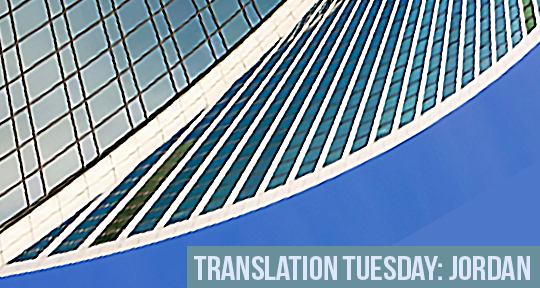For this week’s Translation Tuesday, acclaimed Jordanian writer Hisham Bustani conveys longing and estrangement with a death-defying metaphor in “Balancing Act.” Two individuals are divided by impossible circumstances. Will one risk walking a tightrope to reach the other? The mature and unexpected conclusion defies the simplicity of most parables, and one can even read this poetic story as a meditation on choice itself. Part of the power of Hisham Bustani’s allegory is its applicability to various real-life scenarios: the risks of choosing to cross a divide, be it personal, political, or geographical, always carries the weight of lost (but also new) possibilities.
A rope stretched taut between two tall buildings.
He stands on one rooftop and she on the second, watching each other.
The distance between them isn’t far. Had they been on the ground, they might cross it in twenty paces. But there, on those rooftops with the rope between them, the distance has grown.
The two buildings have no stairs. The two buildings have no elevators. The two buildings have no fire escapes. No one enters the buildings and no one leaves, and they are on those rooftops. There is no other path, and they watch each other from the ends of the tightrope.
He tries to put his foot on the rope. He lifts his foot a little. He hesitates. He hesitates some more. In his mind, he sees that falling would not be a pleasurable experience. In his mind, he sees himself crushed on the pavement. In his mind, he sees people run to where his corpse has fallen and his blood has splattered. In his mind, he hears an ambulance and police cars. All this happens in that moment he lifts his foot a little to put it on the rope. All this happens in that moment of hesitation. That moment of paralysis. He knows how deadly these moments of hesitation are.
He returns his foot to where it had been. He comes to believe that walking across the rope is a certain death.
She feels a little sad that he didn’t take that decision, to either make it across or die. She does not try—she only waits for him to cross.
He looks at the rope again. He thinks that he could grab on to it, cross his feet over the top of the rope and pull. Twenty paces on the ground, that’s how far it is,
but
he does not know.
Is it really worth going to her? He sees that she is waiting for him / his death.
He sees that she believes his crossing is The Immutable Truth—nothing else—nothing else but that decision to cross.
He puts his hand in his pocket. He takes out a pair of scissors he had hidden since the moment he learned he would be trapped on the rooftop of a building with no elevators and no stairs, only a tightrope.
At the moment he cuts the rope, he is filled with joy,
he is ecstatic.
He looks towards the sun, undresses, lies beneath it.
As for her, she takes hold of the rope that now grazes the ground and climbs down.
Translated from the Arabic by Thoraya El-Rayyes
Hisham Bustani is an award-winning Jordanian author of five collections of short fiction and poetry. His fiction and poetry have been translated into several languages, with English-language translations appearing in journals including The Kenyon Review, Black Warrior Review, The Poetry Review, Modern Poetry in Translation, World Literature Today, and The Los Angeles Review of Books Quarterly. His fiction has been collected in The Best Asian Short Stories, The Ordinary Chaos of Being Human: Tales from Many Muslim Worlds, The Radiance of the Short Story: Fiction From Around the Globe, Influence and Confluence—East and West: A Global Anthology on the Short Story, among other anthologies. His book The Perception of Meaning (Syracuse University Press, 2015) won the University of Arkansas Arabic Translation Award. Hisham is the Arabic fiction editor of the Amherst College-based literary review The Common and was the recipient of the Rockefeller Foundation’s Bellagio Fellowship for Artists and Writers in 2017.
Thoraya El-Rayyes is a writer, literary translator and political sociologist living between London and Amman. Her English language translations of contemporary Arabic literature have won several awards, and have appeared in publications including The Kenyon Review, Black Warrior Review, and World Literature Today.
*****
Read more on the Asymptote blog:

